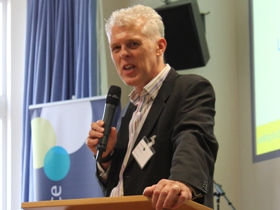EA responds on Steve Chalke on homosexuality
The Evangelical Alliance (UK) has issued a statement in response to an article on homosexuality written by Steve Chalk in Christianity magazine.
statement by Steve Clifford
Gen. Dir. EA
 Steve Chalke is a friend of mine. We go back many years. I am convinced that when the history of the Church in the UK is written, Steve's contribution over the last 25 years will be recognised as profoundly significant. So with this as a backdrop I am writing my response to Steve's article in Christianity magazine. While I understand and respect Steve's pastoral motivations, I believe the conclusions he has come to on same-sex relationships are wrong. Steve Chalke is a friend of mine. We go back many years. I am convinced that when the history of the Church in the UK is written, Steve's contribution over the last 25 years will be recognised as profoundly significant. So with this as a backdrop I am writing my response to Steve's article in Christianity magazine. While I understand and respect Steve's pastoral motivations, I believe the conclusions he has come to on same-sex relationships are wrong.
It is with both sadness and disappointment that I reflect on how Steve has not only distanced himself from the vast majority of the evangelical community here in the UK, but indeed from the Church across the world and 2,000 years of biblical interpretation.
Steve has raised issues which touch on deep areas of human identity. At a Soul Survivor seminar last summer, a Baptist minister who lives with same-sex attraction introduced his talk to a marquee full of young people by indicating that he would love to find a theology in the Bible which would support a sexually-active gay life. But, he said: "I've come to the conclusion that it is not there and I don't want to live in rebellion to the one that I love." This pastor is just one of tens of thousands of Christians who have come to the conclusion that sex was designed by God to be expressed within a committed relationship for life between a man and a woman - we call this marriage - and have chosen to live a celibate life.
Steve Chalke's challenge to historic biblical interpretation is in danger of undermining such courageous lifestyle decisions. Last year, the Evangelical Alliance produced a resource for leaders entitled Biblical and Pastoral Responses to Homosexuality – put together by a commission of eight and peer reviewed by 40. I trust this resource reflects a considered, gracious and mature response. It follows on from the highly respected Faith, Hope and Homosexuality book produced some 14 years ago, combining a clear and succinct statement of biblical teaching on marriage and sexuality.
It expressed regret for the Church's past and present failure in relation to the lesbian and gay community. Realistically and honestly, it engages with real-life scenarios to help Christians, and especially pastors and others in Christian ministry, discern how we can speak and live the truth in love. It can be downloaded online here and hard copies can be purchased for £7 via our website.
Generations of Christians have faced the challenge of making the gospel relevant within their cultural settings. The danger we all face, and I fear Steve has succumbed to, is that we produce 'a god' in our own likeness or in the likeness of the culture in which we find ourselves.
Steve's approach to biblical interpretation allows for a god in the likeness of 21st century Western-European mindsets. His call for "Christ-like inclusion" is not radical enough in its inclusiveness. We all come to the gospel in our brokenness, with an attachment to things, self-centeredness, addictions, fears and pride. We all need a saviour in every area of our lives, including our sexuality. We all live with pain. The radical inclusiveness of the gospel means we are all welcomed. In a wonderful grace-filled process we find repentance and forgiveness and Christ commits himself through the work of the Holy Spirit to bring transformation to our lives - a life-long process.
This is the radical inclusiveness I believe the gospel offers to all of us. God doesn't leave us on our own, He promises to work in us, to bring us into our ultimate goal which is His likeness.
Inevitably Steve's article will open again the conversation on human sexuality. But as we have this discussion let's remember that Jesus requires us to disagree without being disagreeable. We must listen honestly and carefully to one another, being courteous and generous. In 1846, our Evangelical Relationships Commitment was created to guide us in our relationships with other Christians – especially those we disagree with.
I have also written a more detailed reflection on this issue, and I would also encourage you to read this article on biblical interpretation by Steve Holmes, an Evangelical Alliance Board member who heads up our Theology and Public Policy Advisory Commission (TAPPAC).
The Evangelical Alliance seeks to represent the evangelical church community in the UK by being a 'voice' and as an encouragement to Christians within their churches and organisations.
Steve Clifford was appointed in 2009 as General Director taking over the position from his predecessor Joel Edwards.
Steve Chalke is a British Baptist minister, author and programme presenter. In 2001 he founded Faithworks, a movement engaged in Christian social action. In 2003 he provoked considerable controversy in the evangelical world as co-author of The Lost Message of Jesus in which he described the doctrine of sacrificial atonement as 'cosmic child abuse'.
Read Steve Chalke's Christianity magazine article in full.
|